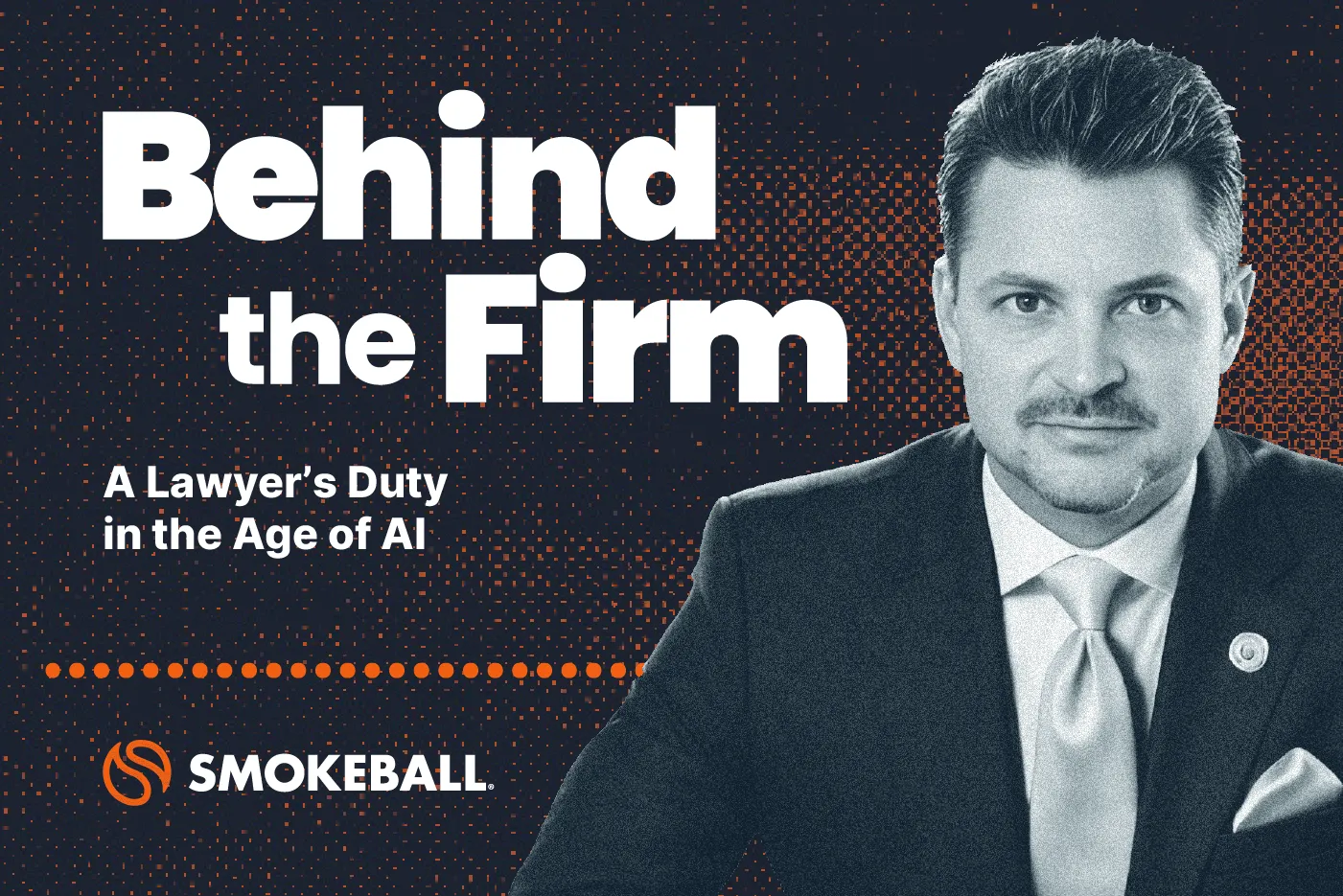Cutting Costs, Not Corners: How AI and Automation Transform Law Firm Back-Office Operations and Boost Profitability

Written by
Stephen Embry
|
June 14, 2024
Written by Smokeball
|
June 14, 2024

Written by Jordan Turk
|
June 14, 2024

Without question, Generative AI (Gen AI) has sparked more debate within the legal community than any other technology. Much has been written about the revolutionary changes that Gen AI and AI may portend. While some lawyers and legal professionals fear what it might and can do, others proclaim that lawyers and law firms have little choice but to rush to adopt and use the technology.
Despite all the hoopla, there appears to be a common theme among legal professionals these days: fear and skepticism toward Gen AI and AI in general. Many lawyers and legal professionals are genuinely frightened. They harbor fears fed by frenzied publicity of Gen AI hallucinations and lawyers being sanctioned for citing cases provided by Gen AI that didn't exist. Many lawyers have little familiarity with what Gen AI and AI can do, how the tools work, and how they could be affected by them.
But lawyers and legal professionals should not let this fear and skepticism impair their embrace of AI, Gen AI, and, for that matter, automation in areas where there can be little debate about its advantages. These tools can and should be employed for back office work. The non billable work that so many lawyers and legal professionals have to do, but for which they are either overqualified or not qualified. This administrative work poses a dilemma for many lawyers: do they pay someone to do these tasks? Do they do these tasks themselves? Or do the tasks just not get done?
Technology creates an opportunity to get these tasks, which can fundamentally impact a firm's bottom line and profitability, done at reduced cost and more efficiently. Gen AI, AI and automation can reduce overhead and allow lawyers and legal professionals to focus more on client service and legal analysis. The very things they are trained to do.
Many of these tools already exist. Smokeball's Legal Practice Management Software, for example, can streamline various back office tasks and reduce costs, whether those costs are in the form of increased labor or, indirectly, through the loss of billable hours. Smokeball offers a comprehensive suite of tools and features designed to streamline the operations of law firms.

AI and Automation for Back Office Tasks
AI and automation can handle many non-legal activities, freeing up valuable time for lawyers and increasing overall profitability. Existing tools can do such things as:
- Billing. AI and automated systems can track time, generate invoices, and even send payment reminders for unpaid bills, reducing administrative burdens and streamlining the financial operations of a law firm. The tools make getting bills out easier and faster and increase revenue. Significantly, AI and automation reduce the time lawyers need to spend billing in general. I know from experience that for most lawyers, reviewing bills and getting them out is the bane of their existence. They often will procrastinate for far too long, impairing collections and profitability.
- Timekeeping. Relatedly, legal timekeeping software can automatically populate billing and invoicing entries. Smokeball, for example, offers automated time entry. The automation saves lawyers and legal professionals time and improves collections and billings.
- Financial management. Financial management programs are emblematic of what AI and data analysis can do by performing tasks that are often mundane and administrative. But if not done or done poorly, these functions can doom a firm. AI and automation tools can do such things as better determine the cost of taking in certain types of work and matters in the first place. Similar programs can be used to determine the experience and skill set of lawyers in a firm by looking at what they have billed for and how much time they spend on specific tasks. From there, firm management could make better decisions on how to staff matters. Smokeball's set of tools, for example, offers the ability to understand lawyers' productivity and profitability and help identify and assess key performance indicators like realization rates and per matter profitability.
- Client intake and onboarding. Automated forms and chatbots can gather client information, screen for conflicts of interest, and even schedule appointments without the need for lawyer input.
- Document management. AI can help organize, categorize, and search firm documents, making financial and other relevant information more accessible. AI can also automate the organization, filing, and retrieval of legal documents. This includes the ability to automatically classify documents based on their content and relevance to specific cases or matters.
- Client Communication. AI-powered chatbots can handle initial client inquiries, provide updates on case progress, and answer common questions, which can improve client service and free up time.
- Marketing and business development. AI powered tools can help analyze client data, identify potential leads, and personalize marketing efforts. AI can analyze data to identify potential clients, personalize marketing campaigns, and optimize the law firm's marketing strategies to attract new business. The tools can also analyze data to help law firms understand market trends, client satisfaction, and potential areas for practice expansion. Automated systems can also help personalize marketing efforts based on client history and preferences.
- General Organization. There are tools that can automate email organization, scheduling and calendaring. These tools can automatically file case related materials in the right place and a myriad of other things on which lawyers and legal professionals spend unnecessary—and non-billable—time. AI tools can manage the scheduling of meetings, court dates, and deadlines without human intervention. They can also send reminders and adjust schedules based on conflicts or rescheduling.

Utilizing Open Gen AI Platforms for Non-Legal Tasks
Gen AI also provides a myriad of opportunities for lawyers to save time spent on non billable tasks. And while closed or private AI systems can be very expensive, open or public Gen AI systems are much cheaper. Yes, there are horror stories of lawyers using open systems and relying on the results without checking. And yes, lawyers should be careful using open systems when client confidential information is involved. But there are valid and safe uses for the open Gen AI systems.
Open Gen AI platforms offer versatile tools that can be adapted for various tasks that do not involve substantive legal matters. Here are some practical ways lawyers can leverage these platforms:
- Marketing. Open Gen AI systems can generate short articles related to an area of the law where the lawyer wants to demonstrate knowledge. Gen AI can generate high-quality, engaging content for blogs, newsletters, or social media. The tool can enhance the firm's online presence and engagement with potential clients. All of these tasks are non billable and time consuming. As a result, lawyers and legal professionals often will not take the time to do them. But forging new client relationships is crucial to the lifeblood and success of a law firm.
- Data Analysis and Insights. Lawyers and legal professionals can use Gen AI platforms to analyze large datasets, such as client demographics or market trends, to make better business development and strategic planning decisions. And spot trends in large data sets you might not see otherwise.
- Due Diligence and Background Checks. Automation tools can quickly perform due diligence and background checks, compiling reports from multiple databases that would take humans much longer to process.
- General Research. Open Gen AI systems can provide explanations of complicated topics, whether they be legal, medical, engineering, or virtually anything else. For example, you can ask an open Gen AI system to provide a 300-word explanation of a complicated topic, such as a statute and regulations and citations to additional authorities.
- Brainstorming. Open Gen AI systems are great for brainstorming. For example, you could ask the tool to give you 20 ideas for a team-building exercise. Or provide some ideas for marketing approaches. Or Christmas gifts for staff or clients. All activities necessary but time consuming.
- Human Resources. OpenAI systems can provide information about all sorts of human resource issues. For example, you might ask the Gen AI tool to create a comprehensive job description or how to organize staff.
- Project management. Let's face it: most lawyers are not very good at project management. And project managers are expensive. On the other hand, you can ask a Gen AI tool to develop a detailed project plan with start dates, end dates, tasks, and roles based on industry standards. It may not be perfect, but it's a whole lot better than what you might do on your own and a lot cheaper than paying a project manager.
- Process Optimization. Gen AI can identify inefficiencies in business processes and suggest improvements, helping law firms reduce operational costs and increase profitability.
No doubt, other uses will become evident as the Gen AI tools become more and more sophisticated.
A Blueprint for the Future
AI, automation, and Gen AI can be used safely and effectively to do the non-billable tasks lawyers don't like and don't need to do. And the tools can be used at a fraction of the cost of hiring staff. The risks are relatively low, provided that lawyers and legal professionals understand the risks and benefits of the technology.
Of course, effective use of any of these tools will still require human input to get the optimum results. AI and Gen AI can not replace lawyers' critical thinking and legal expertise. These tools are, instead, powerful assistants that can streamline processes, reduce administrative burdens, and allow lawyers to focus on providing legal services to their clients.
Back office work may not be as sexy as talking about how Gen AI and AI will revolutionize the practice of law, but doing the blocking and tackling, behind-the-scenes work, is still critical to a healthy law firm. Lawyers and legal professionals don't need to throw the baby out with the bath when thinking about and using AI and Gen AI.
Learn more about Smokeball document management for law firms:
Book Your Free Demo
Ready to see how Smokeball client intake software helps you Run Your Best Firm? Schedule your free demo!










%20(1).webp)





